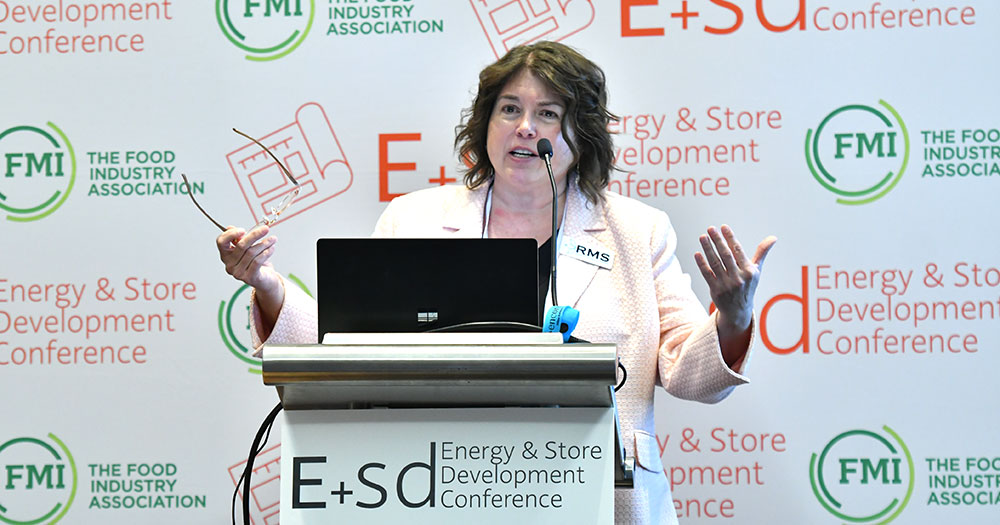By Marjorie DePuy, Senior Director, Supply Chain and Sustainability, FMI and Rick Tibbetts, Communications Specialist, FMI
 Give and you shall receive. This age-old adage is not only fitting for this charitable time of year, but it also provides concise guidance for food retailers looking to maximize customer loyalty and satisfaction. Now more than ever, consumers want to know that the places they do business are stewards of ethical standards and catalysts of positive change. Social responsibility initiatives offer an effective avenue for food retailers to uphold public trust and uplift the communities they serve.
Give and you shall receive. This age-old adage is not only fitting for this charitable time of year, but it also provides concise guidance for food retailers looking to maximize customer loyalty and satisfaction. Now more than ever, consumers want to know that the places they do business are stewards of ethical standards and catalysts of positive change. Social responsibility initiatives offer an effective avenue for food retailers to uphold public trust and uplift the communities they serve.
Fortunately, many consumers already view grocery stores as having their best interests at heart. In fact, 55% percent of shoppers say their primary food store is on their side when it comes to helping them stay healthy – beat out only by their family, friends and doctor. Possessing such trust is foundational for business, and it must be actively maintained if not to be lost.
After all, according to FMI’s U.S. Grocery Shopper Trends 2021 report, 60% of consumers consider open and honest business practices the most important factor in selecting a primary store – a ten-point jump from 2020. Thirty-two percent say community involvement is the most important factor – up five percent from the year before.
These sentiments are not lost on food retailers. According to The Food Retailing Industry Speaks 2021 report, 68% identify social and environmental responsibility as a differentiation strategy they utilize, with many saying this strategy is highly effective for them. Good corporate citizenship has long been a priority for food retailers. Ninety percent already have quantified goals for charitable donations. On the environmental front, 86% have quantified goals and implementation timeframes in place for energy use reduction or are working on them, 61% and 25% respectively.
Efforts to expand diversity, equity and inclusion (DEI) have also been top of mind for many in the food industry. To ensure their company-wide essential workers reflect the communities in which they operate, 73% of food retailers have policies in place to promote diversity in hiring, and 70% have targeted goals for DEI efforts overall.
With insights like these, it’s no wonder why one-third of food retailers saw positive impacts on their business (and 4% or less saw negative impacts) from consumer demands for social responsibility and transparency in 2020. Food retailers that incorporate social and environmental welfare into the traditional scope of work can see a return on investment that goes beyond the balance sheet. Responding to and anticipating the needs of the community and society at large can stimulate sales growth, build trust in the food industry and better our world.
Download The Food Retailing Industry Speaks 2021


 Industry Topics address your specific area of expertise with resources, reports, events and more.
Industry Topics address your specific area of expertise with resources, reports, events and more.
 Our Research covers consumer behavior and retail operation benchmarks so you can make informed business decisions.
Our Research covers consumer behavior and retail operation benchmarks so you can make informed business decisions.
 Events and Education including online and in-person help you advance your food retail career.
Events and Education including online and in-person help you advance your food retail career.
 Food Safety training, resources and guidance that help you create a company food safety culture.
Food Safety training, resources and guidance that help you create a company food safety culture.
 Government Affairs work — federal and state — on the latest food industry policy, regulatory and legislative issues.
Government Affairs work — federal and state — on the latest food industry policy, regulatory and legislative issues.
 Get Involved. From industry awards to newsletters and committees, these resources help you take advantage of your membership.
Get Involved. From industry awards to newsletters and committees, these resources help you take advantage of your membership.
 Best practices, guidance documents, infographics, signage and more for the food industry on the COVID-19 pandemic.
Best practices, guidance documents, infographics, signage and more for the food industry on the COVID-19 pandemic.
